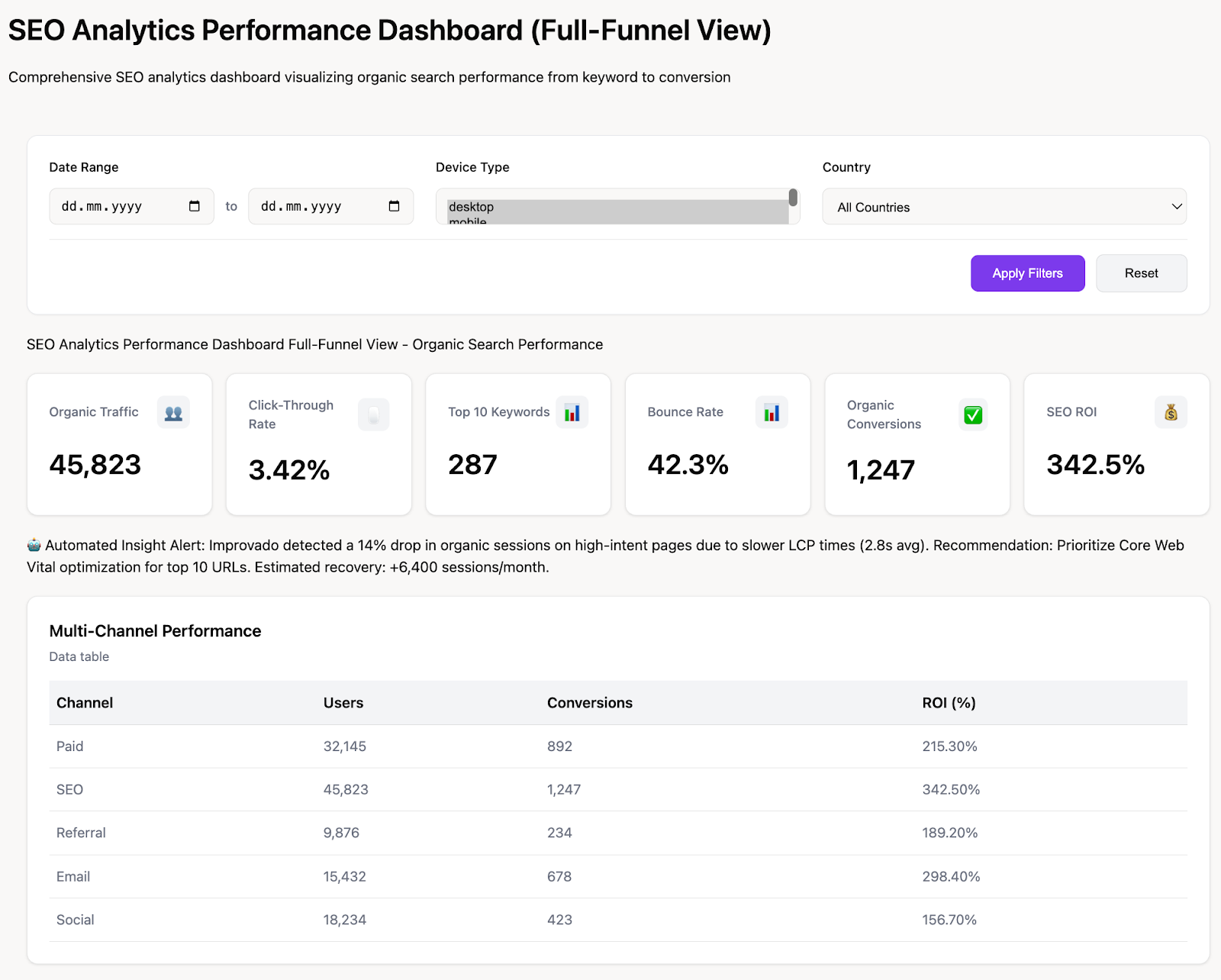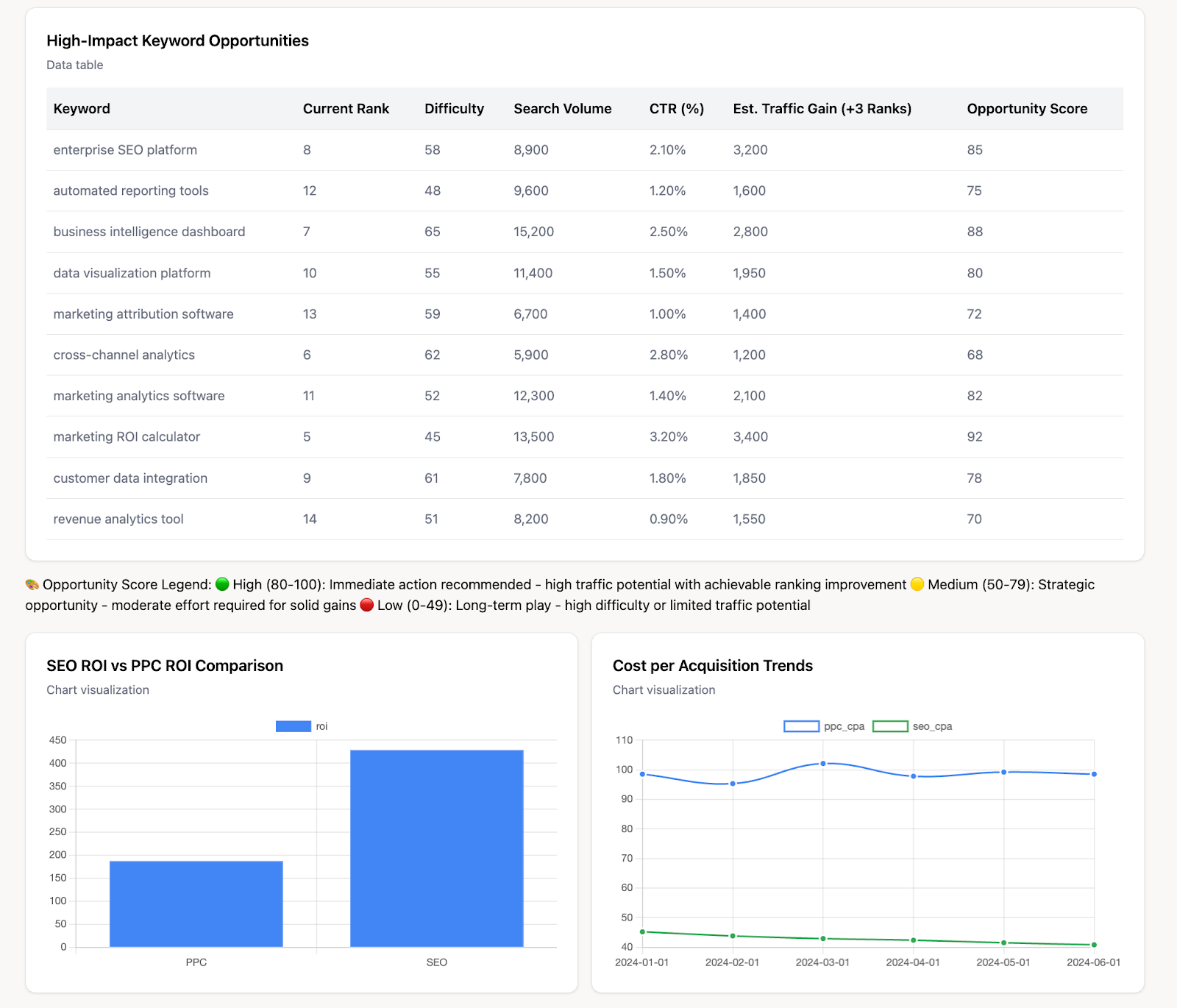In the competitive digital landscape, ranking on the first page of Google doesn’t happen by chance. It’s the result of a deliberate, data-driven strategy.
If you've ever felt lost in a sea of metrics, struggled to connect your SEO efforts to actual business results, or wondered which data points truly matter, you understand the challenge. Without a clear framework for SEO analytics, you’re essentially flying blind, making decisions based on guesswork rather than evidence. This can lead to wasted resources, missed opportunities, and stagnant organic growth.
This guide will demystify SEO analytics, providing a complete roadmap to understanding and acting on your data. We'll cover the essential metrics, the best tools for the job, and a step-by-step process for conducting an analysis that drives higher rankings and measurable business impact.
Key Takeaways
- SEO analytics is the process of collecting and analyzing data to improve organic search performance and connect it to business goals.
- Four core types of SEO, on-page, off-page, technical, and local, form the foundation of any successful strategy.
- Key metrics span performance (traffic, rankings), user engagement (bounce rate, session duration), business outcomes (conversions, ROI), and technical health (site speed, crawl errors).
- A five-step analysis process includes setting goals, gathering data, auditing technical health, analyzing content gaps, and creating actionable reports.
- The right tools, from Google’s free offerings to specialized platforms like Semrush and automated data solutions like Improvado, are crucial for efficient analysis.
What Is SEO Analytics?
Advanced SEO analytics brings together data from Google Search Console, GA4, CRM systems, and data warehouses to show how search performance affects every stage of the funnel. By analyzing patterns across keywords, landing pages, and conversions, teams can see which topics and pages actually drive growth, not just clicks.
The Purpose of SEO Analytics
The primary purpose of SEO analytics is to answer critical questions about your search engine performance. It helps you understand:
- Who your organic visitors are: Their demographics, interests, and how they found your site.
- How they interact with your content: Which pages they visit, how long they stay, and what actions they take.
- Which keywords drive traffic and conversions: Identifying the search terms that bring valuable users to your site.
- How you stack up against competitors: Analyzing their strategies to uncover your own strengths and weaknesses.
- The overall health of your website: Pinpointing technical issues that could be hindering your rankings.
By answering these questions, you can move from reactive adjustments to a proactive, data-driven SEO strategy.
Why SEO Analytics is Crucial for Business Growth
In 2026, SEO operates in a fundamentally different landscape. With Google’s AI Overviews, generative search experiences, and large language models (LLMs) redefining how users discover and consume information, visibility can no longer be measured by rankings alone. SEO analytics has become a strategic intelligence function.
Here’s why it matters more than ever:
- Connects SEO to Revenue: Modern SEO analytics ties organic performance directly to measurable business outcomes—pipeline contribution, revenue influence, and customer acquisition cost (CAC). It’s not just about traffic growth, but about how organic discovery drives real commercial results.
- Optimizes Investment in an Unstable Search Environment: With AI-generated answers and shifting click behavior, traditional metrics like CTR and position are losing predictive power. Advanced analytics helps you identify which content formats and query types still attract high-value engagement and where to reallocate spend as search intent fragments across engines and LLM-based surfaces.
- Enhances Experience and Retention: User behavior data like scroll depth, dwell time, conversion flow offers insight into how humans and AI systems interpret your content. SEO analytics enables continuous UX and content optimization that aligns with both human intent and machine interpretation, driving better engagement and brand trust.
- Builds Competitive Intelligence in the Age of Generative Search: As AI Overviews and zero-click experiences dominate results, understanding how your brand appears (or disappears) within these contexts is critical. Competitive SEO analytics helps map where rivals are gaining visibility within AI summaries, publisher partnerships, and conversational search.
The 4 Main Types of SEO
To build a comprehensive SEO strategy, marketers must address all four dimensions of search optimization. Each type targets a different aspect of visibility, from on-page elements to technical performance and reputation signals.
1. On-Page SEO
On-Page SEO focuses on optimizing the content and HTML code of individual pages to help search engines understand relevance and intent.
It ensures that every page clearly communicates its topic and value to both users and algorithms.
Key elements include:
- Keyword placement in titles, headers, and body copy
- Optimized meta descriptions and title tags
- Image optimization (alt text, compression, captions)
- Internal linking structure and anchor text relevance
- Readability, formatting, and structured data (schema markup)
When executed correctly, on-page SEO improves both ranking potential and user engagement metrics like dwell time and click-through rate.
2. Off-Page SEO
Off-Page SEO includes all activities conducted outside your website to strengthen domain authority and trustworthiness.
Search engines interpret these external signals as votes of confidence in your site’s credibility.
Primary tactics:
- Acquiring high-quality backlinks from reputable domains
- Digital PR and guest posting
- Social media engagement and content amplification
- Brand mentions (even unlinked) and influencer collaborations
Strong off-page SEO builds authority, which often determines how high a site can rank in competitive search results.
3. Technical SEO
Technical SEO ensures that your website is fast, secure, and accessible to search engine crawlers.
Even the best content can underperform if technical barriers prevent indexing or degrade user experience.
Core components:
- Site speed optimization (Core Web Vitals)
- Mobile responsiveness and cross-device compatibility
- Logical site architecture and URL structure
- Secure HTTPS implementation
- XML sitemaps and robots.txt configuration
Fixing crawl errors and broken links
Effective technical SEO enhances crawl efficiency, improves site stability, and directly supports all other SEO efforts.
4. Local SEO
Local SEO targets visibility in geographically relevant searches, which is vital for businesses with physical locations or defined service areas.
It connects your brand to users searching within a specific region.
Key tactics:
- Optimizing your Google Business Profile
- Maintaining consistent local citations across directories
- Gathering and responding to customer reviews
- Creating localized content and schema markup
- Embedding maps and local contact details
Local SEO is crucial for driving in-person visits and high-intent local leads, particularly for multi-location brands or service providers.
| Aspect | On-Page SEO | Off-Page SEO | Technical SEO | Local SEO |
|---|---|---|---|---|
| When to Focus | Optimizing individual pages for relevance, intent alignment, and engagement. | Building authority and trust signals beyond your website. | Ensuring performance, accessibility, and indexability meet search standards. | Targeting local audiences or driving in-person visits and leads. |
| Core Activities | Keyword research, metadata optimization, internal linking, content hierarchy, schema markup. | Link building, digital PR, influencer mentions, brand citations. | Site speed, mobile optimization, structured data, crawl management, HTTPS setup. | Google Business Profile optimization, NAP consistency, local citations, reviews, localized content. |
| Key Metrics | CTR, dwell time, bounce rate, keyword rankings, conversion rate. | Backlink quality, referring domains, domain authority, referral traffic, brand mentions. | Core Web Vitals, crawl errors, index coverage, load time, mobile usability. | Map Pack rankings, local keyword visibility, reviews, calls, direction clicks. |
| Business Impact | Improves visibility and conversions through content relevance and UX optimization. | Builds domain authority and boosts rankings in competitive SERPs. | Enhances crawl efficiency, site stability, and long-term SEO scalability. | Increases local visibility and conversions for geographically targeted audiences. |
Key Metrics to Track in Your SEO Analysis
A successful SEO analysis hinges on tracking the right Key Performance Indicators (KPIs). These metrics can be grouped into four categories that provide a holistic view of your performance.
Performance Metrics
Measure how your site performs across evolving SERPs and AI-generated results.
- Organic Traffic: Tracks the volume of users arriving via unpaid search. Sustained growth reflects strong content relevance and authority across traditional and AI-curated search experiences.
- Keyword Rankings & SERP Visibility: Monitor performance for priority keywords, but also for inclusion in AI Overviews, featured snippets, People Also Ask, and other generative search elements. Visibility in these placements often outweighs classic “rank position.”
- Click-Through Rate (CTR): The percentage of impressions that convert into clicks. High CTR indicates effective title/meta optimization and strong intent alignment, even in zero-click search environments.
- Impression Share: Evaluate how often your pages appear in relevant searches compared to competitors to identify opportunity gaps.
User Engagement Metrics
Reveal how effectively your content satisfies search intent and user needs.
- Bounce Rate: A high bounce rate can signal misaligned content or poor UX, critical to address as Google’s engagement signals influence ranking models.
- Average Session Duration: Indicates content depth and value. Longer sessions suggest meaningful engagement and successful information delivery.
- Pages per Session: Shows how efficiently your internal linking and content structure drive continued exploration.
- Top Exit Pages: Identifies where users disengage, helping to refine page structure, CTAs, and navigation flow.
Business Outcome Metrics
Translate SEO success into measurable commercial results.
- Organic Conversions & Leads: Tracks desired actions (form fills, sign-ups, purchases) from organic sessions, showing SEO’s role in revenue generation.
- Assisted Conversions: Attributes partial credit to organic interactions earlier in the customer journey, essential for multi-touch attribution models.
- Return on Investment (ROI): Compares organic revenue against SEO costs (tools, content, personnel). A positive ROI validates SEO’s role as a sustainable growth driver.
- Customer Acquisition Cost (CAC) via SEO: Calculates efficiency by dividing total SEO spend by organic conversions, key for executive buy-in.
Technical & Off-Page Metrics
Evaluate the foundation that supports visibility, trust, and crawl efficiency.
- Backlinks (Quantity & Quality): Track referring domains, authority, topical relevance, and link velocity. In 2026, trust signals from reputable sources remain critical for E-E-A-T (Experience, Expertise, Authoritativeness, Trustworthiness).
- Page Load Speed / Core Web Vitals: Assess metrics such as Largest Contentful Paint (LCP), First Input Delay (FID), and Cumulative Layout Shift (CLS). Faster, more stable sites rank higher and convert better.
- Crawl Errors & Index Coverage: Monitor via Google Search Console for 404s, redirect chains, and server issues that block indexing.
- Structured Data & Schema Integrity: Ensures AI systems and search engines correctly interpret entities and relationships within your site.
How to Perform an SEO Analysis: A 5-Step Guide
A systematic approach ensures your SEO analysis is comprehensive and leads to an actionable plan.
Step 1: Set Your Goals & KPIs
Before diving into data, define what you want to achieve. Are you aiming to increase organic leads by 20%, rank on the first page for five target keywords, or reduce the bounce rate on key landing pages?
Clear goals and corresponding KPIs will provide focus for your analysis and a benchmark for measuring success.
Step 2: Choose Your Tools and Gather Data
Select the right tools to collect the data you need. A foundational toolkit includes Google Analytics 4 (for user behavior and conversions) and Google Search Console (for search performance and technical health). Supplement these with an all-in-one platform like Semrush or Ahrefs for keyword research, backlink analysis, and competitive intelligence.
Step 3: Conduct a Technical SEO Audit
Your analysis should always start with the technical foundation. Use tools like Screaming Frog or the site audit feature in Semrush/Ahrefs to crawl your website and identify issues. Focus on:
- Indexability: Ensure important pages can be crawled and indexed.
- Site Speed: Analyze loading times and identify opportunities for optimization.
- Crawl Errors: Find and fix broken links, redirect chains, and server errors.
- Mobile-Friendliness: Verify that your site provides a seamless experience on all devices.
Step 4: Analyze Content and Keyword Gaps
With a technically sound site, turn your focus to content. Analyze which pages are driving the most organic traffic and conversions. Use your SEO tools to identify "keyword gaps" – relevant keywords your competitors rank for, but you don’t.
This analysis will reveal opportunities to create new content or optimize existing pages to capture more search traffic.
Step 5: Create an Actionable SEO Report
The final step is to synthesize your findings into a clear and actionable report. Don't just present data; tell a story. The report should include:
- A summary of your key findings.
- A comparison of performance against your KPIs.
- A prioritized list of recommended actions.
- A clear assignment of responsibility for each action item.
This report will serve as your roadmap for SEO improvements over the coming weeks and months.
The Best SEO Analytics Tools for 2026 (Free & Paid)
A strong SEO strategy depends on accurate, timely data. Whether you’re running a small business or managing an enterprise-scale digital operation, the right analytics tools provide the insights needed to measure performance, diagnose issues, and optimize for growth.
Below is a breakdown of the top SEO analytics tools in 2026, grouped by category and use case.
Foundational Tools (Free)
Google Analytics 4 (GA4)
GA4 is the cornerstone of web analytics. It tracks how users find and interact with your site, including organic traffic, user engagement, and conversions. With event-based tracking and AI-powered insights, GA4 connects SEO metrics directly to business outcomes like revenue and lead generation.
Google Search Console
Google Search Console provides unmatched visibility into how Google perceives your site. It delivers metrics on keyword rankings, click-through rates (CTR), impressions, and indexing errors. It’s also essential for monitoring crawl health, mobile usability, and structured data performance, offering diagnostic insights that complement GA4.
All-in-One SEO Platforms
Semrush
Semrush remains a leading all-in-one SEO platform, offering tools for:
- Keyword research and intent analysis
- Competitor benchmarking
- Site audits and health monitoring
- Backlink and rank tracking
It’s ideal for marketers managing large-scale campaigns who need unified visibility into both on-page and off-page factors.
Ahrefs
Ahrefs is best known for its world-class backlink database, but it also excels at:
- Content gap analysis to uncover missed opportunities
- Site audits to find and fix technical issues
- Keyword and SERP analysis for competitive intelligence
Automated Data Platforms
Improvado

For enterprise organizations, integrating SEO data into the broader marketing and revenue analytics ecosystem is often one of the most complex data challenges.
Improvado streamlines this process by automating data aggregation, normalization, and governance across 500+ marketing and analytics platforms, including SEO-specific and supporting sources such as Google Search Console, Semrush, Ahrefs, Google Analytics 4, Moz, Bing Webmaster Tools, and more.
The platform ensures all SEO data is cleaned, deduplicated, and standardized before being stored or visualized, creating a single source of truth for organic performance.

Improvado enables teams to:
- Unify SEO and Paid Data: Measure how organic visibility contributes to overall marketing ROI and cross-channel attribution.
- Automate SEO Dashboards: Eliminate manual reporting through live, self-updating dashboards with unified metrics (rank, CTR, traffic, conversions).
- Monitor Data Quality and Governance: Maintain consistency across teams and reporting environments with schema enforcement and audit trails.
- Enable AI-Driven Insights: Power predictive models and LLM-based assistants that surface performance anomalies, content gaps, and growth opportunities.
Specialized SEO Analysis Tools
Screaming Frog SEO Spider
Screaming Frog remains the go-to desktop crawler for technical SEO audits. It identifies:
- Broken links and redirect chains
- Duplicate or missing metadata
- Inconsistent canonical tags and hreflang errors
- Page depth and crawlability issues
For enterprises, it’s invaluable for diagnosing site-wide health and preparing structured datasets for automated ingestion into analytics environments like Improvado or BigQuery.
Summary Table: Top SEO Analytics Tools for 2026
| Category | Tool | Primary Use Case | Best For |
|---|---|---|---|
| Free Platforms | Google Analytics 4 (GA4) | Traffic and conversion analysis | Understanding user behavior and ROI |
| Free Platforms | Google Search Console | Keyword and crawl insights | Monitoring search visibility and health |
| All-in-One Suites | Semrush | SEO and competitor intelligence | Managing comprehensive SEO campaigns |
| All-in-One Suites | Ahrefs | Backlink and keyword data | Off-page analysis and link strategy |
| Automated Data Platform | Improvado | Data aggregation and automation | Enterprises unifying SEO + marketing data |
| Technical Auditing | Screaming Frog | Crawl diagnostics and issue detection | Technical SEO professionals |
Conclusion
To understand the true impact of organic search, businesses must connect SEO insights with paid, social, and revenue data. Only then can teams see how visibility, engagement, and conversions tie directly to growth and profitability.
Improvado enables that connection by automating the aggregation, normalization, and analysis of SEO data alongside every other marketing and revenue source. It delivers clean, governed, and analysis-ready datasets that empower teams to uncover deeper insights, faster.
Ready to connect your SEO performance to real revenue impact? Book a demo today.
.png)



.png)
